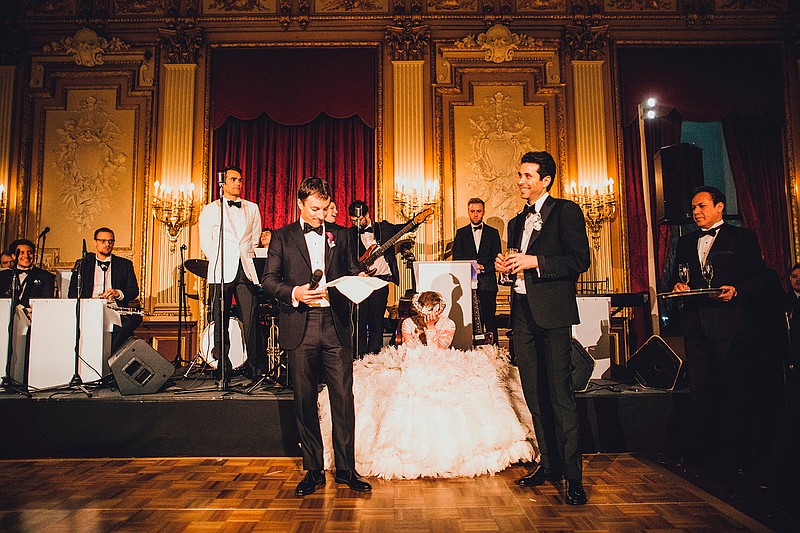Today's weddings are often planned down to the tiniest detail, sometimes at great expense, to create a truly "perfect" day. But for better or for worse, one random element remains: the speeches and toasts that honored guests stand up and give.
Often they're sweetly, if awkwardly, memorable. A heartfelt toast might even be a highlight of the day.
But how often do couples hold their breath wondering what the best man or grandpa or someone else might say with a microphone (and perhaps a drink) in their hand?
"Couples do worry about it," says Chicago-based wedding planner Regina Brooks, "whether it's 'my dad is long-winded and I don't want to bore everyone' or 'my uncle's going to be drunk.'"
Brooks, owner of Regine Danielle Events, once had a groomsman approach her during a reception to say he'd be giving a surprise speech, but it would only take 10 minutes.
"He broke out A.V. equipment and played a game," she remembers. "It took 45 minutes."
In this era of the hyper-planned wedding, how do couples and wedding planners approach the unpredictable nature of moments like these?
TALK IT THROUGH
Touch base in advance with those whom you've chosen to speak. Be honest about time limits and your concerns about private stories or potentially sensitive subjects like politics or religion.
Focus on the positive: You're choosing to include this person and share the spotlight with them. If a couple presents the chance to speak as an honor, "then that person feels that they've gotten the trophy," says Jennifer Taylor, a New York-based wedding planner. "They're most likely not going to put too much angst into it."
When Brittany McElwee was planning her wedding three years ago, she had already been a maid-of-honor on three occasions.
She'd heard long, awkward speeches at many weddings, and remembered her mother pointing out that "no one ever complained that a toast was too short."
McElwee worried that some guests would want to hold forth on religion, while others would be bothered by the subject.
So she and her groom opted to let only the maid-of-honor and best man speak.
If more people spoke, "there was more potential for things to go wrong," McElwee says. "I just felt like we should minimize it to those two people, give it a few minutes, give the opportunity to put your glass in the air, and move on to the next thing."
Taylor agrees, especially for couples who worry about what might be said: "You don't want to have nine speeches at a wedding. Always try to limit it to two, possibly four if the parents are going to speak."
Timing? Five minutes or less per speech, Taylor says.
Suggest that someone work with the speaker, to hear the speech out loud and time it.
"You don't want to pause the night," Taylor says. "You don't want to lose the momentum."
LET THE EXPERTS HELP
If you're working with a wedding planner, or if the venue has supplied someone to help manage the day, Brooks and Taylor both say you can ask that person to help manage the flow of speeches.
"I will be the bad guy," Brooks says.
The DJ or bandleader can also help. Angelique Noto is getting married next month in the New York area, and she's already spoken to her DJ about the toasts.
If a speech goes on too long or gets inappropriate, she says, "that's when I'll turn to Burton and have him cut the mic."
Brides have asked Taylor to proofread and edit speeches in advance.
Respectfully offering that kind of help (without micromanaging) can be a relief to many family members.
Still, couples may find that some guests will ignore their plans and preferences.
"Some people just love the mic. It doesn't matter where they are," Brooks says.
"I had a wedding that was out of the country and the bride and groom were very adamant that they only wanted three or four particular people to speak. I ended up with a line of people that wanted to talk and it didn't matter what I said."
USE THE REHEARSAL DINNER
If you'll be gathering with a smaller group the night before the wedding for a walk-through of the ceremony and a dinner to celebrate, Brooks suggests asking friends and relatives to speak then. It's still a special occasion, yet less stressful and more intimate.
Lelia Vogel, who is getting married in the Pittsburgh area next month, worries that the best man may choose to tell embarrassing stories about wild nights with the groom. "I have really bad control problems," she laughs, so the idea of that happening in front of elderly relatives at the wedding is stressful.
Moving potentially wilder stories to rehearsal-dinner toasts limits who might hear them.
EMBRACE THE RANDOMNESS
In the end, perhaps it's a good thing that one piece of the wedding day can't be entirely predicted.
"It's nice when you're the bride or groom to be listening to people toasting you," Taylor says, even if you are a bit nervous about what they might say.
Melissa Rayworth writes about lifestyle topics for The Associated Press.

